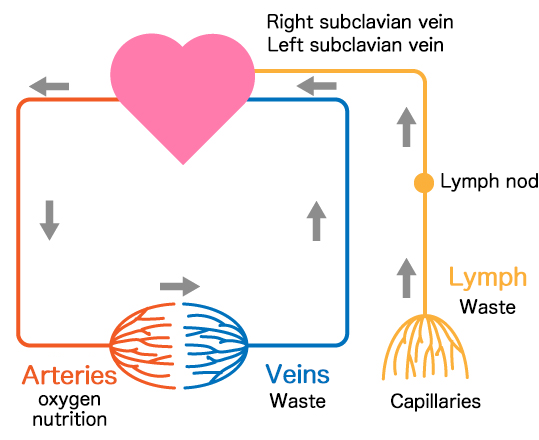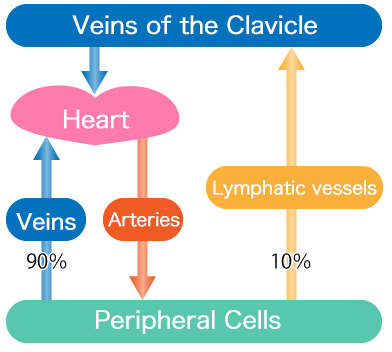Swelling and Lymphedema
To deepen your understanding of lymphedema, we will first talk about blood vessels and lymph vessels, then the difference between bloating, edema, and swelling.
Blood Vessels and Lymphatic Vessels
As you may know, blood vessels are the pathways for circulating blood throughout the body, and blood goes from the heart through arteries to the capillaries throughout the body, returning to the heart through the veins. Lymphatic vessels, on the other hand, are the pathways for lymph fluid, which is a one-way structure. Under our skin, blood vessels and lymphatic vessels are stretched out like a network.

While 90% of body fluid is collected in veins, the 10% percent, called seminal fluid, is absorbed by lymphatic vessels throughout the body. This is the lymphatic fluid. Lymphatic fluid is a clear, colorless to pale yellow, slightly sticky liquid that flows slowly through the lymphatic vessels and returns to the heart in the same manner as the veins, then enters the veins near the heart and circulates throughout the body again. Lymphatic fluid plays a major role in the circulation of body fluids, with a flow rate of about 1 liter/day in an adult.

The Functions of Lymphatic Fluid
As the blood conducts trades with cells via the blood vessels, the lymphatic fluid absorbs relatively large substances that cannot be collected by blood vessels, such as proteins and other minerals, along with water. Bacteria, foreign substances, cancer cells, and other pathogens are also absorbed into the lymphatic system, entering into the lymphatic nodes. The lymph nodes act as a filter against bacteria and foreign substances, preventing inflammation throughout the body.
「The Difference Between Bloating, Edema, and Swelling
- Bloating usually refers to the accumulation of fluid in the body due to a decrease in the circulatory function of the vascular system and heart and the urinary function of the kidneys. Excess lymphatic fluid is stored outside the lymphatic vessels without being collected, resulting in a swollen state.
In medical terms, this is called edema.
- On the other hand, swelling typically refers to an increase in volume due to the accumulation of blood components outside the blood vessels.
In medical terms, it is called “swelling.
What is lymphedema?
- While swelling can be caused by a variety of factors, lymphedema is a condition in which swelling of the arms and legs is caused by a decrease in lymphatic function as a result of cancer surgery or treatment.

Akitatsu Hayashi
Kameda Medical Center / Kameda Kyobashi Clinic
Director of Lymphedema Center
Dr. Hayashi presented state-of-the-art lymphatic vessel imaging technology using Ultrasound and Optical
Coherence Tomography (OCT) for the first time in the world. He focuses on the spread of more efficient and
effective lymphedema surgery using the technology.Check profile more
関連記事
原因・発症・進行と症状 診断 治療法 術後 手術の注意点・合併症 予防と運動療法



